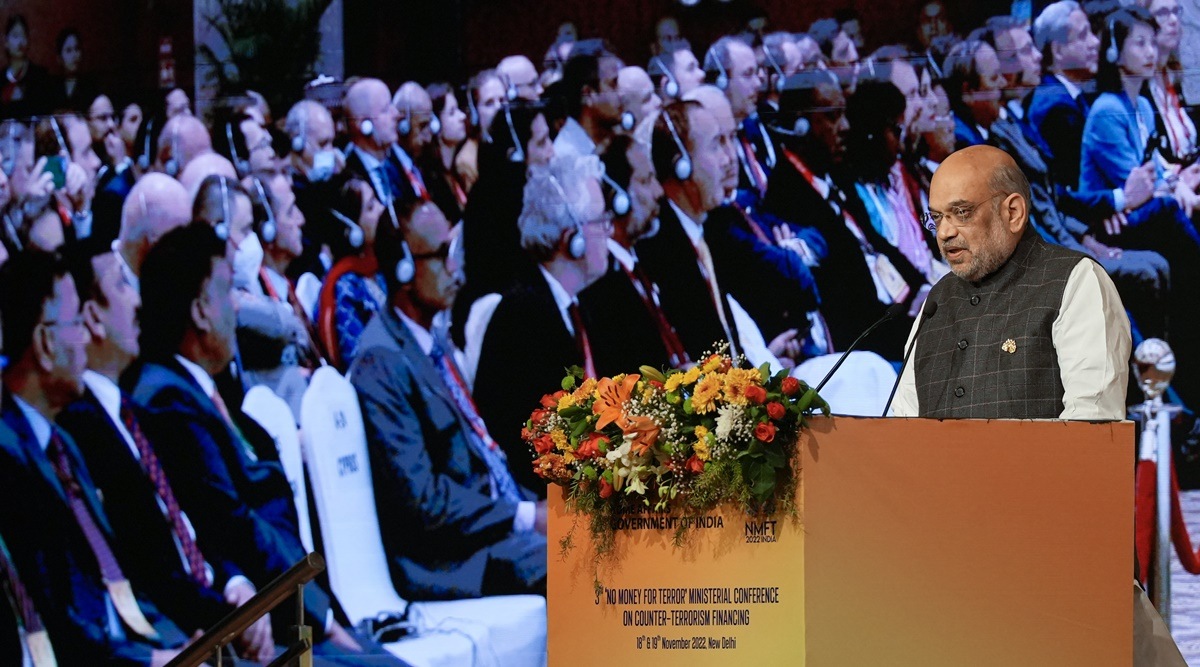A DAY after Prime Minister Narendra Modi’s veiled attack on China and Pakistan for “supporting terrorism”, Home Minister Amit Shah reiterated his views, saying that some countries have made terrorism their “state policy” and calling for a “strict economic crackdown” in such “terror havens”. Saying that terrorism has no international boundaries, Shah urged all countries to “rise above their geo-political interests”, and fight “shoulder-to-shoulder” against the threat.
Addressing the concluding session of the third ‘No Money for Terror’ conference here, Shah proposed to set up a permanent secretariat in India to sustain the focus on countering terror financing.

In similar remarks, External Affairs Minister S Jaishankar, who also addressed the conference, pointed out the “use (of) terrorism as a tool of statecraft” by some, and said the world needs to rise above political divides to address the peril. “The challenge, however, is that while the bad guys think global and lateral, the good guys still think national and vertical,” he said.
In his speech, Shah also proposed a five-pronged strategy to deal with terror financing, including a “monitoring framework” for cooperation between intelligence agencies. Calling for “beyond-border cooperation”, he emphasised the need for “complete transparency” among countries in sharing intelligence.
“Some countries, their governments and their agencies have made terrorism their state policy. In these terror havens, it is necessary to shackle their unrestrained activities along with a strict economic crackdown. All the countries of the world will have to make up their minds on this, rising above their geo-political interests,” said Shah.
His remarks are seen as a reference to Pakistan and recent developments in Afghanistan that have forced the West to re-engage with Islamabad, given its influence in Kabul. It is in this context that the Indian security establishment has been viewing the relief granted to Pakistan by the Financial Action Task Force (FATF) despite Islamabad’s continued support to India-focused terror groups.
“Some countries repeatedly support terrorists and those who harbour terrorism… terrorism has no international boundaries, so all countries should think beyond politics and cooperate with each other,” he said, in what was interpreted as a reference to China too.
Story continues below this ad
According to officials, Pakistan and Afghanistan are not participating in the meet while China was invited but did not come.
Shah asked all countries to build consensus on a common definition of terrorism and terror financing. “It is an issue of the protection of our citizens, and their human and democratic rights, it should not become a political issue,” he said.
Saying that terrorism is the biggest enemy of democracy, human rights, economic progress and world peace, Shah said: “No country or organisation can successfully combat terrorism alone. The international community must continue to fight shoulder-to-shoulder against this increasingly complex and borderless threat”.
Shah said that while the United Nations Security Council’s counter-terrorism sanctions regime has “curbed, to some extent, the actions of countries that make terrorism a state-funded enterprise”, it has “to be further strengthened, made more rigorous, and transparent”.
Story continues below this ad
“Our first commitment should be cooperation with transparency. All countries, all organisations, must pledge complete transparency in sharing intelligence in a better and more effective manner. We have to fight this war against terrorism and terrorist groups, in every geographical space, in every virtual space,” he said.
Without naming the Popular Front of India (PFI), he said: “There have been many instances when, under the guise of other motives, some organisations promote terrorism and radicalisation at the national and international levels. It has also been found that these organisations tend to become the medium of financing terrorism. Recently, the Government of India has banned an organisation that conspired to radicalise the youth and push them towards terrorism. I believe that every country should identify and take stringent action against such organisations.”
Shah also warned against the “growing links of terrorism with organised crimes such as narcotics, crypto-currency and hawala”. “According to an estimate by the IMF and the World Bank, criminals around the world launder around 2 to 4 trillion dollars every year. And a major part of it goes to fuel terrorism,” he said.
Calling for a long-term strategy, he outlined some priority issues including: preventing diversion from legal financial instruments by fighting anonymity in financial networks; restricting the use of proceeds of other crimes for terrorist activities; preventing use of new financial technologies, virtual assets like crypto-currencies, wallets etc., for terror activities; eliminating the use of illegal channels, cash couriers, hawala by terror networks; preventing the use of non-profit organisation to spread terror ideology; continuous capacity building of counter-terror and financial intelligence agencies of all countries.
Story continues below this ad
Shah said the strategy to fight terror financing must be based on “five pillars”. “The first pillar is to establish a comprehensive monitoring framework involving cooperation, coordination, and collaboration among all intelligence and investigative agencies,” he said.
He listed the other pillars as: the strategy of trace, target and terminate, to be adopted from low-level economic offences to more organised economic crimes; strengthening and harmonising the legal structures related to terror finance; developing a robust mechanism against the misuse of Next Generation technology; strengthening the legal and regulatory framework for asset recovery.
Meanwhile, making similar oblique references Pakistan and China, Jaishankar said that among the reasons behind the growing threat of terrorism in recent years was the “continued tendency of some to use terrorism as a tool of statecraft and willingness of others to justify and obfuscate that”.
He said it was “important that all states collectively follow an undifferentiated and undiluted approach to terrorism.”
Story continues below this ad
“Terror is terror and no political spin can ever justify it. World needs to rise above political divides to address this peril. The battle against terrorism must be fought resolutely on all fronts, in all situations and at all places. The challenge, however, is that while the bad guys think global and lateral, the good guys still think national and vertical. Essential to encourage a ‘whole of the government’ approach at home and a ‘whole of the world’ approach abroad,” he said.









